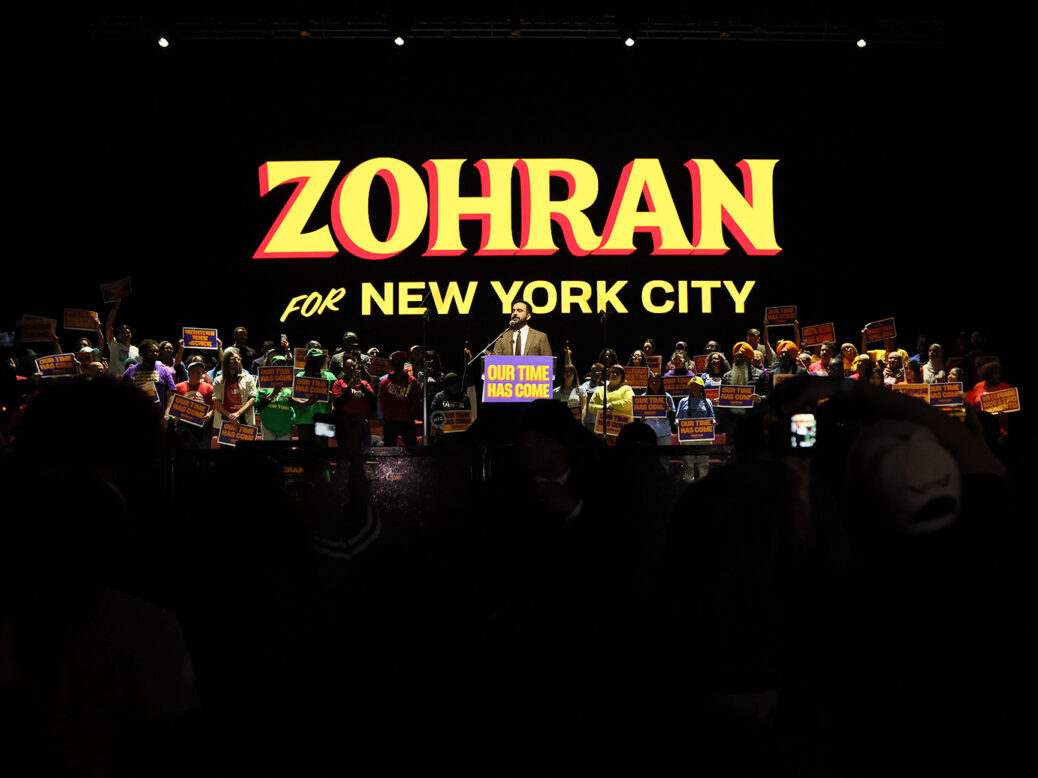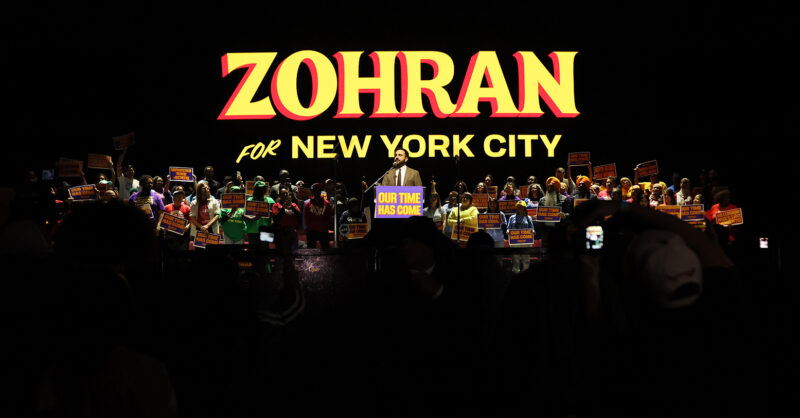
Photo by Michael M. Santiago/Getty Images
You could, with crass simplification, write the history of New York in three phases, beginning with the patronage of the Tammany Hall machine, which ran the city from the mid-19th century to the early 1960s. Next came the gratifying, though sometimes ruinously abstract appeals to the conscience of New York’s left-liberal, mostly Jewish political establishment. That period began with the Jewish mayor Ed Koch in 1969 – with conservative detours under Mayors Giuliani and Bloomberg that nevertheless kept the city’s liberal structures intact. Now there is the entirely new style of subtle populist exclusion invented by Zohran Mamdani. His exclusions are directed with special intensity at New York’s Jews.
Mamdani’s anti-Zionism, in the second most Jewish city in the world, is as bewildering as it is emphatic. For a long time he refused to renounce calls for a global intifada – involving, in the eyes of many, violence against Jews – and more recently declined to call for Hamas to give up its weapons as part of the current (toothless) peace agreement. Though he later recanted both positions, it was with a wink: he did so under enormous political pressure and his followers understand what it takes to win. One position he has not reversed is his insistence that Israel should not be a Jewish state. Given that New York’s 1.3 million Jews are a decisive bloc of voters, Mamdani’s behaviour seems politically suicidal.
Mamdani’s strident commitment to the Palestinian cause, a strange fixation on foreign policy for a mayoral candidate, could well be partly a function of his character. Like Andrew Cuomo, who received his political career on a silver platter from his father, former New York governor Mario Cuomo, Mamdani seems to have digested, wholly uncritically, his prominent academic father’s post-colonialism. (Beware the un-rebellious sons – Kennedy, Bush, Trump – of powerful fathers.) But there is a more practical reason for Mamdani’s peculiar-seeming obsession.
Mamdani swept the Democratic primary with a good many Jewish votes. The other decisive voting bloc in New York is black voters, and with these Mamdani lagged behind, in some precincts far behind, Andrew Cuomo. He cannot win in November without the black vote. He is well aware of the fact that black voters in South Carolina, in 2016 and 2020, rejected Mamdani’s fellow “populist” Bernie Sanders (Sanders is one of the least effective members of the Senate) for Hillary Clinton and then Joe Biden. Across the Hudson River, in New Jersey’s impending gubernatorial election, the Democratic candidate, Mikie Sherrill, is begging for black support. The black backlash against the preening, ineffective white condescension of the woke era is confounding the Democratic party.
The ugly fact is that behind Mamdani’s vocal anti-Zionism is a calculated attempt to court black voters. This is not to say that black New Yorkers are anti-Semitic. That is hardly the case. New York’s black and Jewish people have marched together and fought for equity and justice together; they have joined up to make New York the most generous city to the poor in the country. At the same time, relations between black and Jewish New Yorkers have been tortured for generations. For decades, Jewish landlords mistreated and exploited black tenants. The city’s Jewish establishment supported the mayoralties of Rudy Giuliani, then Michael Bloomberg; the first violated civil rights with Giuliani’s draconian enforcement of law and order, the second made the city unaffordable to a growing black middle class.
But, most consequentially, there was the Ocean Hill Brownsville controversy. In 1968, black parents in that neighbourhood of Brooklyn took control of the local school board, in the name of dismantling white prejudice, and fired 19 white teachers. The largely Jewish union went on strike, violence ensued, and since then the school system has wobbled back and forth between decentralisation and centralisation. It has been centralised since 2002, and Mamdani wants again to decentralise it. But relations between black people and Jews in New York were never the same.
Mamdani is cynically and shrewdly exploiting that tension. In American life, where events become increasingly symbolic, Mamdani theatrically and pointlessly declaring that he would arrest Netanyahu if the Israeli leader ever set foot in New York shook even people such as myself, who believe that Netanyahu is a war criminal. The carefully calculated image of a Jewish leader behind bars in a New York City jail strikes buried chords that have nothing to do with Israel or Palestine. That is so especially for New Yorkers – black people, newer immigrant groups – eager to throw off New York Jewish hegemony, just as Jews in New York once replaced the Irish and Italian political establishments.
Subscribe to The New Statesman today from only £8.99 per month
People like to cast the upcoming New York mayoral election as an intergenerational conflict. To some extent, that might be so, but if Mamdani were facing an older candidate who was not, unlike the 67-year-old Cuomo, personally corrupt and politically self-interested and erratic, that person would be way ahead in the polls. The election is a conflict between the city’s multiple social groups, as hardball urban political contests in America always are. In Jewish New York, Jews are being surpassed by history. Mamdani smells weakness, not as a Hamas sympathiser, or an anti-Semite in anti-Zionist clothing. He smells weakness as a ruthless opportunist.
Tug a bit at the rest of Mamdani’s “principles”, and his entire democratic socialist façade comes tumbling down. He is about as much a democratic socialist as Steve Bannon. Rather Mamdani is what passes for populism on the left these days. He talks the talk of gentrified lefties, whose family money allows them to inhabit the stratospherically expensive “democratic-socialist” enclaves of Brooklyn and Manhattan. “Team gentrification” is what House Minority Leader Hakeem Jeffries calls Mamdani’s political operation, referring to the way Mamdani’s army of wealthy suburban-born supporters have slowly displaced black New Yorkers from their neighbourhoods. (Jeffries nevertheless ended up endorsing Mamdani at the last minute.)
It is more than a little ironic that Michael Harrington, one of America’s few genuine democratic-socialist intellectuals – his book, The Other America, inspired Lyndon Johnson’s War on Poverty – opposed the decentralisation of schools in the name of a fully accountable, centralised policy of racial and socio-economic integration. But then, Mamdani also opposes charter schools – half-private, half public, funded by taxpayers – though these have transformed the education of the city’s poor black children, and are overwhelmingly favoured by black parents. Setting himself against charters schools was how Mamdani won the support of the city’s teachers union, who oppose charter schools because they are not required to hire unionised teachers.
In fact, in this city where schoolchildren have some of the lowest reading and mathematics scores in the country, Mamdani has no concrete, specific plans for education, other than to make expensive promises for which he will not have the money. This pampered product of the city’s most exclusive private and public schools wants to hire one thousand new teachers every year; to do that, he would have to freeze the wages of all teachers. Cuomo, to his credit, wants to double the number of the city’s specialised high schools, which are the city’s educational crown jewel. Mamdani has no plans to do so. Mamdani wants to end the city’s gifted and talented program for kindergarten students because he claims it favours white students. Cuomo, to his credit, wants to vastly expand access to them for all students.
As for the rest: Mamdani’s plans for city-owned grocery stores? New York already has perhaps the most generous food assistance programs in the country. Why should any poor person settle for what would surely be the least nutritious state-purchased food when they can buy good, healthy food at any grocery store they want? Freezing the rent on the city’s one million rent-stabilised apartments? It won’t make a difference to the millions who don’t have one; it won’t make New York housing any more available or affordable than it is now. And you can say goodbye to modest black landlords, and to necessary repairs in a precarious economy. Making buses free for the poor when the poor already pay half fares? That is not going to change anyone’s life, other than to make the buses mobile shelters for the homeless. Raising the minimum wage, as Mamdani wants to do, to $30 per hour from $16 per hour? If he did that, busboys would almost be making the same starting salary as public school teachers. So much for “from each according to his ability, to each according to his need”.
The fact is that the Mamdani the firebrand populist is more cautious than the most cautious career politician. At the second, and final, mayoral debate, he would not take a stance on controversial proposals to stimulate housing development. Such a policy would weaken New York’s City Council’s power to thwart housing projects it didn’t like and Mamdani is afraid to anger the Council’s members. He also fears alienating the residents of wealthy neighbourhoods where some of the new housing would be built. Yet the approved proposals would do far more to make housing available and affordable than freezing already-protected rent-stabilised apartment. Cuomo said he would support them.
And so it goes, as the ruthlessly divisive and secretly timorous – the shadow of that powerful father – Mamdani dangles before a Trump-dazed electorate the siren song of a radical redistribution of wealth. Would it were so. In this surreal time, the candidate with the most surreal promises, it seems, has the edge. Only New York’s governor, Kathy Hochul, has the power to raise personal and corporate taxes, and if she did, the money would go to the entire state, not just New York City. But, alas, she never will raise taxes to such a radical extent. As a result, if Mamdani becomes mayor of New York, he will lack the funds for his TikTok politics. Instead he will blame Trump for the city’s ills, while Trump – who has fallen silent about New York’s mayoral election; he clearly wants Mamdani to win – makes Mamdani the poster boy of an unreal, untethered and dysfunctional left-liberal politics. With Mamdani, America’s liberals will be jumping out of the frying pan of a woke dead-end into the fire of a say-anything demagogy that is a mirror image of the right. And yet, in New York, in the entire country, there is nowhere else to turn.
[Further reading: The rise and rise of Zohran Mamdani]
Content from our partners


